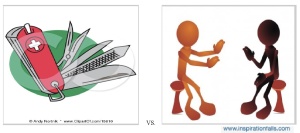“A good interpreter is a master of speech and a good translator is a master of the written code.”(Alfredo Vargas). Though both require a distinct set of skills, both also have a shared set of traits. Most of the concepts below also apply to translation, or may be slightly modified to fit the written word.
Interpreting is one of the most complex roles in the world. And it is highly underestimated by society at large. The role of a professional interpreter is to convey faithfully and completely the content of the source language by finding adequate equivalent concepts and terms in the target language, and doing this in seconds, literally. The professional interpreter can make very fast decisions and improvise creatively. He or she must have great interpersonal skills, including great patience and empathy. We must be intimately familiarity with both cultures of the working languages to ensure that each concept AND each term used are thorough, accurate, adequate and is correctly used and expressed in the context of the conversation.
As an interpreter, you need to develop a wide array of technical skills. However, I believe that at the basis of interpreting we need the following: First and foremost, obviously, you need to be fully bilingual. You need to have full command of at least two languages. Next, you need to be a very creative person. You need to love to improvise. To create something from nothing. To switch gears at the drop of a pin. Interpreting is all about being attuned with your environment and adjusting immediately to any change in the environment. Creativity is, in my opinion, at the core of any interpreter’s traits. I believe that if you are not a highly creative human being who feels very comfortable improvising and adapting, it will be extremely difficult to be an interpreter. All the other skills you can learn. Creativity, you have to be. So, my first recommendation would be to ask yourself: am I creative and can I improvise? Or am I a more rigid methodical thinker? Because interpreters are also methodical thinkers, second, improvisers first.
Next, you should develop other non-technical skills, that are: listening, acquisition of knowledge, public speaking, note taking, and memory.
After that, the first thing is to learn how to listen. The interpreter needs, above all, be an extraordinary listener. Listen to what the person is saying, not what you think the person is saying , but what they are really truly saying. You need to learn to grasp the meaning behind the speakers works, the message being conveyed, the context in which that message is being rendered. To do that, you need to hone on your listening skills. My recommendation. Listen to the news on TV and Radio. Just sit and listen. Don’t try to translate or jot down. Sit and listen, during hours and hours. That is your first task. To learn to listen. To learn not to make assumptions. Not to guess what the person is going to say. Not to judge what has been said. Just listen to the words and message of the person talking. To concentrate and keep your thought process centered on the source of the messages, not on your own thoughts. And do this in both languages of your language pair.
Second, be knowledgeable. Read a lot. Read all sort of newspapers, either on the computer or printed. Read magazines about the world. Follow international affairs. Increase your general knowledge in the areas you plan to interpreter. If you can, go and live in the countries where your language pairs are mostly spoken. Learn about the local cultures. If you cannot go and live there, use the internet, watch youtube videos about those countries and regarding those cultures, watch movies, listen to the news, if you have cable TV, get those countries news, buy the magazines that center on those cultures. If you are going to be an interpreter, for example in healthcare, read all sorts of medical magazines. Go to your doctor’s office and read all the brochures, all the magazines. Go to the internet and read read read the blogs on medical and clinical information. Read the websites on healthcare. If it you are going to translate in the legal field, watch all the TV programs you can where there is any type of police or investigative reporting. Watch cop movies. Read law mystery books. And so on.
Third, you need to convey your thoughts appropriately. You need to learn to be very efficient with words. You need to build up your vocabulary. Know about as many subjects as you possibly can. Read glossaries. Make the reading of glossaries your passion. Stop reading just for the pleasure of reading and give meaning to your reading habits. Concentrate on downloading glossaries from the internet on the subjects of your interest and read them. Don’t try to memorize them, just put them in the hard drive of your brain where you will have access to the information when you need it.
Enroll in public speaking groups. Practice speaking out loud. Don’t hold your thoughts, start expressing your thoughts in the shower, in the car, when you are cleaning your home. Talk talk talk, specially in your second language. Become progressively fluent and comfortable expressing your thoughts. Learn to react very fast, to strengthen the connection between your thoughts and your tongue. Every day in the morning and at night try translating the local news for about half an hour. Do not judge yourself. Just let the words come out. It does not matter if at the beginning you don’t get it right. Learning to swim or ride a bike takes time. And the only way to learn it is doing it. If you don’t do it you will never learn it. The same is true for interpreting.You need to develop excellent communication skills, with the ability to express thoughts understandably, delivering your speech in such a way that it is clear and concise in all registers and at varying levels of formality or informality as be required. Do not judge yourself. Just do it, right or wrong, many times. Expertise will come with practice. The more you do it, the better you will improve your skills.
Fourth, extremely important, learn a fast note-taking technique. Take a shorthand writing course, there are many for free on the internet. Or learn to take your own notes. Practice practice practice taking notes. Do it independently of your exercises in listening or your exercises in speaking or your collection of knowledge. Note taking should be a skill highly developed by all interpreters. It is going to be one of the most valuable skills you can have. Once you feel comfortable taking notes fast, start specializing in taking notes regarding numbers and addresses. Turn on the TV to the financial channel and try to take the notes of all the numbers you hear. Do not judge yourself at first. Just let your skill develop. It will take time and practice. Do it do it do it. You have to practice practice practice.
The fifth essential skill is, of course, memory. The interpreter must have a very good memory or a very good memory to remember what has been said. Although the interpreter will be taking notes of much of what is said, it will be impossible to write down everything, so the interpreter must trust his or her memory to be able to ensure accuracy and completeness. Exercise your memory constantly. However it works for you, find a way to exercise your memory. The brain is like a muscle. The more you exercise it, the fitter it will be.
Of course, these are just some of the steps you need to develop to become an interpreter. You will need to study a lot and learn to analyze content and develop fast reactions, you need to learn to build and use glossaries, to manage stress and perform within strict codes of conduct and ethics, to be in total command of your native and non-native languages, to become familiar with the cultures of the countries your languages represent. You will need to learn to maintain a friendly attitude, even in very distressful situations. To exercise tact and judgement with people who are rude and obnoxious. And cultivate your curiosity, it is your best friend. Keep yourself current. Make learning into a hobby. Learning what? Everything, anything. It is essential to develop a sense of patience and humor, as you will most probably have to deal with a lot of human tragedy and the load may become overwhelming unless you can see yourself just as a bridge between two points, and not necessarily the superwoman or superman that can solve all situations you come in contact with.
It is essential that you become proficient with computers and modern technology, as they will make part of our every day life. In time, as you become more proficient in your craft, you will need to ensure you are familiar with colloquialisms, idiomatic expressions and slang in both working languages. You need to develop the ability to identify the difference sin meaning due to dialects and regionalism.
To become a true professional, you need to have an open mind and learn about the roles of the interpreter, and the boundaries that you need to have, applicable laws and procedures, cultural competence, ethical and professional behavior, quick decision making, excellent customer skills, ability to prioritize and multitask, a huge amount of patience and humility, problem solving and flexibility.

















